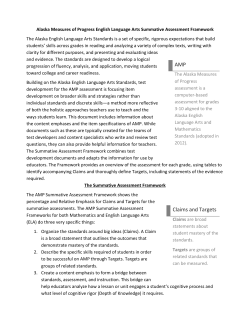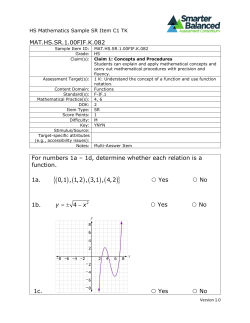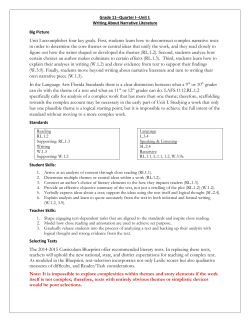
Lesson Plans
Lesson Plans Newell LA III and Advanced Week 13: 11/10-- 11/14/2014 Unit 3: Narrative/Point of View MONDAY 11/10 TUESDAY 11/11 WEDNESDAY 11/12 Learning Goal: Students will be able to identify the elements of fiction and be able to analyze the elements, paying special attention to how incidents in a story (conflict) can affect the characters, cause decisions to be made, and affect the overall plot structure of a story. After learning the elements and how to effectively analyze them, students will be able to create their own narratives and analyze the elements found in their own stories. 1. What is the difference between an inference and an explicit statement? 2. What is the value of an author providing evidence to substantiate his point of view? 3. How does using an effective writing technique lend to an author’s authenticity? Essential Question Higher Order Questions LAFS.8.RL.1.1 (DOK 2) 1. What inference can you draw from the statement? What evidence supports your inference? 2. What evidence strongly supports the key idea ___________? 3. What is the author’s strongest evidence provided that supports the idea _________? What makes that evidence stronger than other evidence provided? Objective(s): Students will create their own short stories/narratives and analyze the elements found in their stories. LAFS.8.W.1.3 (DOK 3) LAFS.8.RL.1.2 (DOK 2) LAFS.8.RL.1.3 (DOK 2) Recursive Standard: 8.RL.2.4 FRIDAY 11/14 LAFS.8.W.1.3 (DOK 3) LAFS.8.RL.1.2 (DOK 2) LAFS.8.RL.1.3 (DOK 2) Recursive Standard: 8.RL.2.4 Veteran’s Day LAFS.8.W.1.3 (DOK 3) LAFS.8.RL.1.2 (DOK 2) LAFS.8.RL.1.3 (DOK 2) Recursive Standard: 8.RL.2.4 THURSDAY 11/13 Standard(s) LAFS.8.RL.2.6 (DOK 3) 4. What evidence does the author provide to support different characters’ viewpoints on __? 5. What viewpoints conflict with (character’s) take on __? How does the author present these viewpoints? 6. Does the author present a particular viewpoint more effectively? How does he/she do it? 7. Why do you think the story is told from __? Viewpoint? What advantages/disadvantages does this present? Students will create their own short Students will create their own stories/narratives and analyze the short stories/narratives and elements found in their stories. analyze the elements found in their stories. St. Augustine Field Trip No School Bell work Agenda/Activities Would you rather…? 1. I Do: Review Literary Elements/ Learning Scale No School No School Would you rather…? 1. Write narrative and analyze the elements Would you rather…? 1. Complete narratives and analysis 2. We Do: Discuss bell work and learning scale Vocabulary St. Augustine Field Trip 3. You Do: Characterization Sheet and Setting Sheet Setting, characters, protagonist, antagonist, conflict, internal conflict, external conflict, plot, exposition, rising action, falling action, climax, resolution, point of view, characterization, realism St. Augustine Field Trip St. Augustine Field Trip Homework Read at least one chapter from AR book Narrative due 11/17/14 No School Ticket Out Reflect on learning No School Accommodations Read at least one chapter from AR book Narrative due 11/17/14 Reflect on learning Read at least one chapter from AR book Narrative due 11/17/14 Reflect on learning ESOL Accommodations E1: Making use of contextual clues—gestures, expressions, body language E2: Using multiple media E3: Using linguistic modifications: repetition, slow speech, restating, controlled vocabulary, controlled sentence length E4: Individualized instruction and assistance E5: Peer Tutoring E6: Using written and pictorial forms to teach: maps, graphs, charts, pictures, audiovisual aids, lists, semantic maps, webs, flow charts, outlines E7: Adjusting or shortening assignments E8: Hands of Experiences E9: Small group instruction E10: Cooperative Learning E11: Defining content area language or terms for students E12: Using alternative assessments E13: Reducing oral and written directions and information to easy to understand steps or parts E14: Using role play E15: Adapting written text and materials to facilitate comprehension ESE Accommodations Assignments 1: Extended Time 2: Preferential Seating 3: Check for Comprehension beyond what is normally provided to student 4: Provide peer assistance Tests 1: Extended Time 5: Read aloud directions 6: Alternative testing format St. Augustine Field Trip St. Augustine Field Trip
© Copyright 2025





















